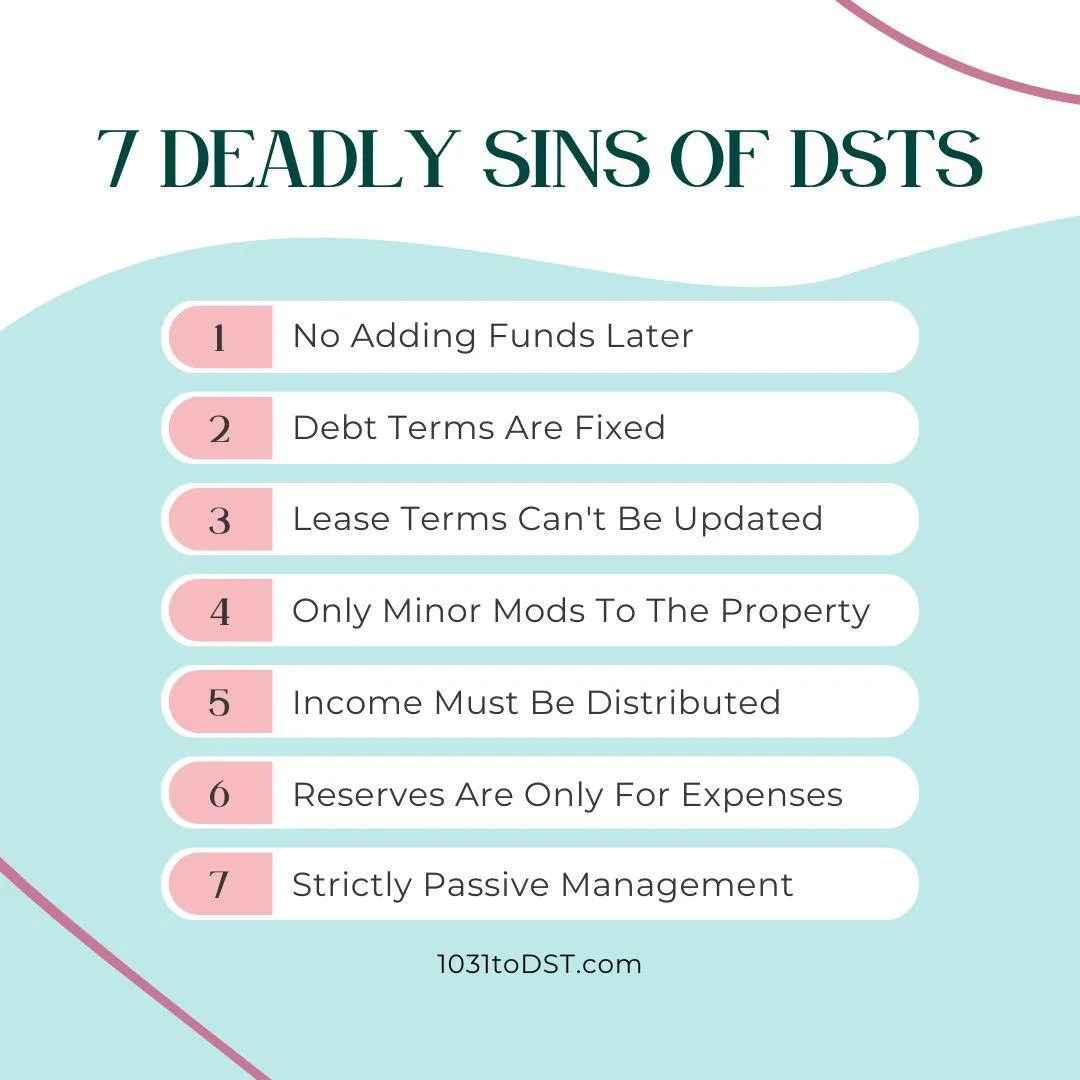The Seven Deadly Sins of DST's: A Comprehensive Guide
October 9, 2024 • 7 min read

Delaware Statutory Trusts (DST's) are a popular tool for investors looking to defer taxes through a 1031 exchange while enjoying the benefits of passive income. However, the IRS has established strict guidelines, often referred to as the "Seven Deadly Sins," that ensure DST's maintain their passive nature.
These rules are essential for compliance but can also limit the flexibility and control investors might desire. Let’s dive deeper into the seven deadly sins of a DST and what they mean for investors.
1. No Additional Contributions
"The trustee may not accept additional contributions of assets
(including money) to DST."
At its core, a DST is a legal entity that allows multiple investors to pool their resources and invest in real estate assets. This type of trust is particularly beneficial for those looking to engage in passive real estate investment. Formed under Delaware law, a DST offers an innovative way to own shares in large properties while enjoying limited liability and numerous tax advantages.
DSTs are popular for those seeking a hands-off approach to real estate investing. They provide an opportunity to invest in institutional-grade properties without the responsibilities of direct property management. This approach is particularly useful for passive investors, allowing them to focus on returns rather than operations.
2. No Renegotiation of Debt
"The trustee may not renegotiate the terms of the debt
used to acquire Blackacre."
DST's are locked into the short-term debt obligations or other debt terms established when the trust is created. Whether it’s the interest rate, payment schedule, or other loan conditions, they cannot be renegotiated. While this promotes stability, it may become a challenge if market conditions change and refinancing could offer better terms.
Implications for Investors
Investors should closely examine the debt terms tied to the DST to ensure they’re favorable for the long term. It’s also wise to consider the broader economic climate and the potential risks of fixed debt terms over time. Delaware Statutory Trust beneficiaries are unable to take advantage of changing interest rates, making the initial debt structure crucial.
3. No New Leases
"The trustee may not renegotiate the lease with Z or enter into leases with tenants other than Z, except in the case of Z’s bankruptcy or insolvency."
Once a DST is in place, it cannot negotiate new leases or adjust existing ones, except in specific circumstances like a tenant's bankruptcy. This ensures the trust remains passive but can create challenges if market conditions or tenant needs evolve. The DST sponsor must adhere to the lease in place and cannot enter into new leases unless required by law.
Implications for Investors
This restriction places a significant emphasis on the quality of the tenants and lease agreements in place when the DST is formed. Investors must assess the reliability and stability of the existing lease agreements and tenants before committing. The master tenant must be vetted thoroughly since changes are only allowed under narrow conditions.
3. No New Leases
"The trustee may not renegotiate the lease with Z or enter into leases with tenants other than Z, except in the case of Z’s bankruptcy or insolvency."
DST's are limited to making minor non-structural capital improvements to properties unless legally required. This ensures that the trust avoids becoming an active property manager, but it also restricts structural capital improvements that could enhance property value.
Implications for Investors
Properties in need of major renovations or upgrades might not be ideal for a DST structure. Investors should thoroughly inspect the property condition and plan for minimal intervention during the trust’s lifetime. The trust may make capital expenditures but only if they fall under minor non-structural modifications or are required by law.
5. No Reinvesting of Proceeds
"Because the trust agreement requires that any cash from Blackacre be distributed quarterly, no reinvestment of such monies is possible."
Any income generated by the DST must be distributed to investors on a quarterly basis. Unlike other investment structures, DST's are not allowed to reinvest these funds, even if doing so could increase overall returns. Sales proceeds and earnings and proceeds from operations must be distributed, not reinvested.
Implications for Investors
This rule emphasizes steady, predictable cash flow rather than growth. While it ensures regular payouts, it limits the potential for compounding returns within the trust itself. Investors seeking growth opportunities may need to explore complementary investment options. This also means that liquid cash is promptly returned to investors instead of being used for property upgrades or acquisitions.
6. Reserves for Expenses Only
"The trustee is authorized to establish a reasonable reserve for expenses associated with holding Blackacre that may be payable out of trust funds."
DST's are allowed to maintain a reserve fund, but its use is strictly limited to covering property-related expenses, such as maintenance, taxes, or insurance. These reserves cannot be used for speculative purposes or new investments, only for managing DST property.
Implications for Investors
This reserve ensures operational stability, protecting investors from unexpected costs. However, it doesn’t offer flexibility for reinvestment, which reinforces the trust’s passive investment nature. Investors must understand that reserves are meant to sustain the property rather than offer additional profit potential.
7. Limited to Collecting Income
"The trust agreement provides that the trustee’s activities are limited to the collection and distribution of income."
The trustee of a DST is restricted to collecting rental income and distributing it to investors. They are not permitted to actively manage the property or engage in business activities that could generate additional revenue. DST offerings must remain purely passive, focusing only on collecting rent and ensuring distributions to beneficiaries.
Implications for Investors
This rule ensures DST's remain a hands-off investment. Investors benefit from the passive nature of the trust but must accept that there is no room for operational involvement or creative revenue generation. DST beneficiaries' interests are limited to collecting regular income rather than pursuing active property management strategies.
Why Understanding the Seven Deadly Sins Matters
For investors, understanding these restrictions is key to making informed decisions about whether a DST aligns with their financial goals. While the 7 deadly sins of a DST provide stability and compliance with IRS rules, they also require investors to adopt a passive approach to real estate investing.
The Seven Deadly Sins ensure that DST's remain a tool for steady income and tax deferral, not active property management or speculative growth. By planning ahead and carefully evaluating a DST’s structure, investors can maximize the benefits while staying aligned with the trust’s limitations. Whether you're searching for where you can find DST seven deadly sins or seeking to understand how property development DST 7 deadly sins might impact your investments, this guide provides the essential insights to navigate these complex structures.
SEMPER
- “Always Grow”
S: Sell your property in a seamless way using an investosemperr-friendly real estate agent. Or, just talk to a 1031 exchange expert for help.
E: 1031 Exchange your newfound equity with a savvy qualified intermediary (your 1031 exchange expert).
M: Match your equity with a DST or other replacement property that fits your investment goals. This requires a DST sponsor or broker.
P: Pocket cash flow from your investment property and work with tax specialists to maximize your in-pocket returns.
E: Expand your DST property’s equity with time. It's important to choose your DST wisely so it appreciates well.
R: Repeat this process to grow your real estate portfolio and your returns. Once the DST term is complete, you can 1031 into the next one.
Would you like to talk about DST's and learn more?

Jeffrey Lemoine
Jeffrey is a real estate advisor focused on finding creative ways to solve problems.
1031 to DST
Navigation
Resources
Legal
Copyright 2025. 1031 To Dst. All Rights Reserved.